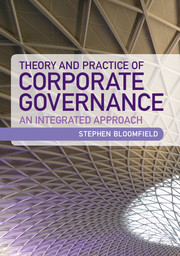Book contents
- Frontmatter
- Contents
- List of Figures and Tables
- Introduction
- Part 1 The Discipline of Governance
- Chapter 1 The landscape and definitions of governance: the major actors
- Chapter 2 Inward-facing governance
- Chapter 3 Outward-facing governance
- Part 2 The Relationship between Law and Governance
- Part 3 Governance and the Listed Company
- Part 4 Governance and Regulation
- Part 5 Counter-governance: Failures of governance and corporate failure
- Bibliography
- Index
- References
Chapter 3 - Outward-facing governance
from Part 1 - The Discipline of Governance
Published online by Cambridge University Press: 05 March 2013
- Frontmatter
- Contents
- List of Figures and Tables
- Introduction
- Part 1 The Discipline of Governance
- Chapter 1 The landscape and definitions of governance: the major actors
- Chapter 2 Inward-facing governance
- Chapter 3 Outward-facing governance
- Part 2 The Relationship between Law and Governance
- Part 3 Governance and the Listed Company
- Part 4 Governance and Regulation
- Part 5 Counter-governance: Failures of governance and corporate failure
- Bibliography
- Index
- References
Summary
This chapter will:
introduce the concepts of operational and longitudinal dimensions of governance;
describe the concept of stakeholders and their role in governance;
introduce the concept of the Governance Equation as a means of relating theoretical governance to practice, referring to the operational and longitudinal concepts;
discuss the idea of corporate social responsibility and civil society.
Traditionalist/legalist theories of governance relegate the significance of stakeholders to a subordinate position. The Cadbury definition did not include them at all; the OECD definition gave them a grudging inclusion as a subordinated element – ‘other stakeholders’ – to the primacy of the shareholders.
The traditionalist view places the shareholder at the centre of governance – but still as only one of the legs of the triumvirate of shareholder, director and auditor. Yet in practical terms the claims of the stakeholders en masse outweigh the claims of the shareholders as a group. To take only four of the potential herd of stakeholders: without customers there could be no income; without suppliers there would be no raw materials; without workers there would be no production; without the State there would be – at the absolute minimum – no enforceability of contracts. Consideration of these parties’ claims to involvement in the governance process again underlines the inaccuracy of regarding the shareholder as the pivotal point of governance, and emphasises the position as the holder of the residual contract. The shareholder is not so much central to governance but might well be regarded as being at either the periphery or at the beginning and the end of the governance process – depending on the world view taken: operational or longitudinal (discussed below).
- Type
- Chapter
- Information
- Theory and Practice of Corporate GovernanceAn Integrated Approach, pp. 55 - 78Publisher: Cambridge University PressPrint publication year: 2013



